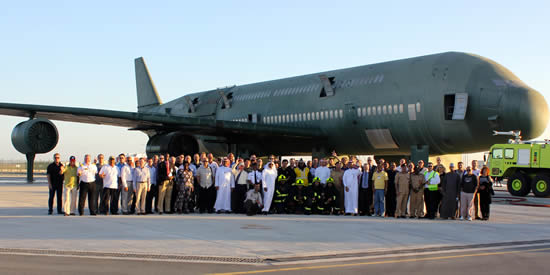|
Delegates from 36 countries gathered in Dubai this week for ARFF 2013 - Aircraft Rescue & Fire Fighting.
The event opened with key messages to ensure the world’s airports are ready to deal with aircraft accidents and keep air travel safe, and the first day’s conference featured some key case studies from airports that have already faced major aircraft incidents.
The audience heard from Changi Airport how they dealt with the Qantas emergency in 2010. The Qantas A380 suffered an uncontained engine failure on takeoff and had to dump fuel and circle the skies over Singapore and Indonesia before it was allowed to make an emergency landing at Runway 2 at Changi Airport.
Cletus Packiam, Chief, AES, Changi Airport Group presented the sequence of events that lead to the successful safe handling of this flight. A total of 469 passengers and flight crew were safely evacuated on 4 Nov 2010.
 |
| The full scale A380 simulator, built for Dubai Airports, was the setting for live fire demonstrations which preceded the opening of ARFF 2013. The audience comprised Airport Fire Chiefs from around the globe. |
The keynote address from Mark Edward
Woodward, UAE General Civil Aviation Authority, welcomed everyone to the first middle-east hosted ARFF event and painted the picture of then and now, explaining how far the UAE has come in aviation safety and fire fighting in a very short space of time. He told the audience on Tuesday that the UAE is now spending time and resources into developing and ensuring their Aerodrome emergency services are well trained and using state of the art equipment.
Gillies Crichton, Head of Assurance, Glasgow Airport Limited, highlighted the vital role the ARFF departments have in building resilience at the Airports, one of the key businesses in the aviation industry. “The ARFF has a key role to play in restoring normality in the shortest possible timescales, thus permitting full, or at least partial operations to resume. ARFF departments should broaden their horizons from simple emergency planning to embracing a more holistic approach to business resilience in order to underpin the survival of the industry upon which we all depend.”
Dubai Airports were officially supporting the inaugural ARFF event in Dubai and all the UAE Airports were represented at the event by their Chief Fire Officers.
Khalid Al Muhairi, Chief Fire Officer, Dubai Airports said “It is a great pleasure for Dubai to host such an important event for the Aviation Fire industry as ARFF 2013. We invest a lot of time and resource into developing our ARFF teams at the airports here in Dubai and across the UAE and we welcome hosting global forums such as these in Dubai.”
The second day of ARFF focused on training, with speakers discussing the importance and choices of modern day fire fighter training as well as revalidating their qualifications frequently.
One quote from John
Anderson, Fire Chief, Emirates Response Services summed up the importance of up to date training: When confronted with a catastrophic event that endangers lives and high value assets . . . "You don’t rise to the occasion . . . you fall-back to your highest level of training!”
|